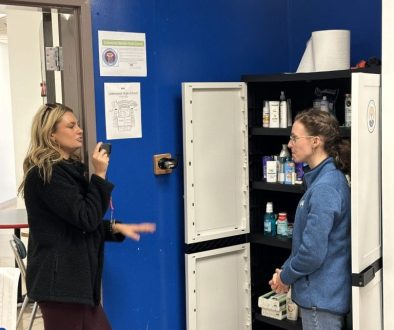Honesty for Ohio Education director tells Newark crowd state budget hurts public schools
Written by Kent Mallett at the Newark Advocate
Key Points
- Christina Collins, executive director of Honesty for Ohio Education, a non-partisan statewide organization, encouraged a Newark audience to lobby state lawmakers to protect public education in the state budget in a United Way event on Tuesday, May 27.
- Honesty for Ohio Education, a nonpartisan organization, advocates for increased public school funding in the state budget.
- The organization claims that increased state funding for private schools, through vouchers, comes at the expense of public schools.
- Honesty for Ohio Education requests full funding of the Fair School Funding Plan, updated cost calculations and removal of the revenue cap.
- Local superintendents argue that the revenue cap would be detrimental to school districts and that the state should respect local levy decisions.
NEWARK − Christina Collins, executive director of Honesty for Ohio Education, a nonpartisan statewide organization, encouraged a Newark audience to lobby state lawmakers to protect public education in the state budget.
Collins, a former Ohio State Board of Education member who started her teaching career at Northridge, said public education is under attack at the state and federal levels, and increases in state funding for private schools come at the expense of public schools.
The United Way event on May 27 included Heath City Schools Superintendent Trevor Thomas, Licking Heights Superintendent Kevin Miller and former Ohio State Board of Education member Michelle Newman in the audience.
“What is happening with the state budget is truly an existential crisis for our public school systems in Ohio in many different ways,” Collins said. “No matter what way you look at it, when all the money is coming from one bucket, and more money keeps going to private schools than to our public school students, where there are 90% of the kids, that is creating a problem.”
Collins said Newark City Schools is slated to lose $1.7 million over two years from the state budget and $600,000 in special education funding. She said the district will also lose $2.3 million in federal Title 1 funding, $2.4 million in special education funding and $4.2 million for school meals.
Preliminary 2024-2025 data shows 5,672 students enrolled in Newark City Schools and the district receiving $5,035 from the state share of the base cost per student.
Meanwhile, 419 students who live in the Newark School District using private school vouchers can receive up to $8,407 from the state per student, with no income cap. Collins said 78% of those 419 students are not low-income students.
“A billionaire can apply and get at least 10% of the voucher,” Collins said. “The most recent expansion of vouchers is a free-for-all.
“Tell your reps to not approve even more money for private schools. Stop giving money to private schools until we can adequately and appropriately fund our public schools for the 90% of students who attend there.”
The budget has been passed by the Ohio House and the under consideration in the Ohio Senate. The Advocate reached out to state Sen. Tim Schaffer, R-Lancaster, who represents Licking County, for a comment but received no response by deadline.
Honesty for Ohio Education states the current version of the state budget gives $432.6 million in new funds to private school voucher programs and $226 in new funds to public schools. The organization also states that $600 million is slated for the Cleveland Browns new football stadium.
Collins said Honesty for Ohio Education has three main requests: Fully fund the final phase of the bipartisan Fair School Funding Plan; update the costs and input calculations from 2022 to current levels, accounting for inflation; and remove the revenue cap.
Collins explained the revenue cap, which she said varies from 30% to 80% based on when levies were passed in a district.
“The state has said if districts have more than 30% of their operating costs held in reserve, they should have to give that money back to their community. That practice sets off a dangerous cycle that causes districts to have to go back more and more frequently for levies. That’s what it does.
“They say schools are hoarding all this money. And they’re not. They maintain reserves so they don’t have to go back to voters over and over and over. That’s kind of a point that’s really being missed here. The reserves are important. They serve a purpose. There’s a reason they exist.”
The two superintendents spoke out on the revenue cap.
“The revenue cap would be catastrophic to districts. The 30% is probably more a minimum of what we need to have on hand,” said Thomas, the Heath superintendent. “We need the reserves because we don’t know what we’re going to be facing long-term.”
Miller, the Licking Heights superintendent, said that when he worked in rural areas of northwest Ohio, farmers were not fans of school levies.
“The message always from farmers is, ‘We don’t expect a levy — never,'” Miller said. “‘Not in five years. Not in 10 years. Not in 20 years. We expect you to build your reserve and be conservative with how you spend your money’ because as farmers, what do they do? They protect their reserve because if you have a bad year in the field, you better have a good reserve.”
Miller said the state should respect levy decisions made by local voters and locally elected school boards.
“In my mind, state legislators have no right to step in the way of local boards of education who know their communities and their voters well,” Miller said.
The Fair School Funding Plan, Collins said, was bipartisan, with hundreds of experts involved. Miller said the plan was developed by school superintendents and treasurers based on actual data.
“It pays what it costs to educate a typical child. It provides a transparent blueprint for school funding that is research-based on what it actually costs to educate a child,” Collins said. “The Statehouse fully supported it and promised to fully fund it.
“It was the first way that Ohio really tried to get a constitutional funding method in place. And right now we’re talking about going back to the unconstitutional method of just throwing out a number every year.”
The spending by public school districts is carefully scrutinized, Collins said, while private schools do not have to provide any accounting of the expenditures of the public money they receive.
“There is no financial reporting for private schools the way there is for public schools,” Collins said. “No transparency, no accountability. Where’s the accountability for public dollars?”
The superintendents, despite the difference in their ages, agreed these are trying times for public education in Ohio.
“It is an unprecedented time,” Thomas said. “I’ve been a superintendent for 12 years, and I don’t recall an attack on funding like this.”
Miller said: “Well, I’m older. I’ve done it for 42 years, and I’ve never seen such an attack as we’re seeing right now. Your voice does matter.”




